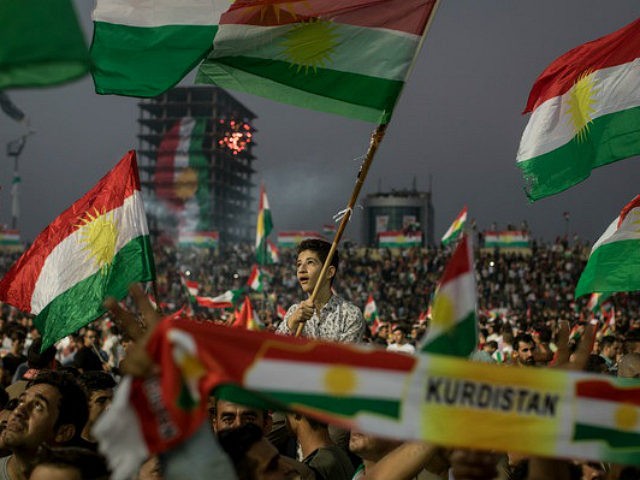ERBIL, Iraqi Kurdistan — As voters at home wait for President Donald Trump to deliver on signature campaign promises, the Kurds – key allies hoping for change from Obama’s disastrous policies – now have a reason for disappointment.
In a last-ditch effort against this month’s Kurdish independence bid, the White House declared that the United States “does not support” the Kurdish intention to hold a referendum, adding that the referendum is “distracting from efforts to defeat ISIS and stabilize liberated areas” and that the Kurds should call off the “particularly provocative and destabilizing” vote.
After a century of war, genocide, and oppression, White House Press Secretary Sarah Huckabee Sanders – alongside Iran and Turkey – is the latest to tell the Kurds that they still do not have the right to self-determination.
These statements follow a visit to Iraqi Kurdistan by Defense Secretary James Mattis and calls from Secretary of State Rex Tillerson to postpone the referendum.
This flurry of efforts culminated with White House Special Envoy Brett McGurk’s visit in which he met first with elements of Kurdish opposition more closely aligned with Baghdad and Iran before meeting with Kurdistan Region President Massoud Barzani. It appeared McGurk’s intention was to further divide the Kurdish political landscape along long-running fault lines.
What if a foreign superpower dispatched senior emissaries to meddle in American state politics? What would American voters say to French or Chinese officials doing the same thing in their country?
The “timing” is always cited as an issue, but a guaranteed, internationally-sanctioned alternative date is never offered.
Another suggestion by Western leaders is that the referendum “lacks international legitimacy.” However, a quick read of the U.N. Charter and certain resolutions, the Montevideo Convention, and the post-Cold War Vienna Declaration and Charter of Paris shows they all support the right of self-determination for the Kurds. These documents do not grant exceptions to human rights based on “timing” or other transient concerns of foreign powers.
If Britain, Scotland, Catalonia, Quebec – and even Texas and California can secede – why can’t the Kurds? From which authority does the White House get the power to determine the fates of other peoples on other continents?
It appears in this case that the international community lacks both the moral authority and the legal grounds to declare a referendum for self-determination “illegitimate.”
America’s $22 million in direct aid to the Iraqi Kurdish forces runs dry this month, while cash, arms, and humanitarian aid still flows to Baghdad and the Iranian-backed Islamist proxies with which it operates in tandem. It is unknown when or if additional American aid for the Kurds will arrive.
The only territory still held by ISIS and bordering Iraqi Kurdistan is the Hawija pocket, which the Peshmerga are set to liberate as early as this month. ISIS’s abilities to wage offensive operations was eradicated long ago. Perhaps ISIS is now just a convenient excuse.
What does this message send to weary Kurds in Syria, who now find themselves cornered by Assad, Iran, Russia, and Turkey? America made clear to Syrian Kurds on Tuesday that it does not support elections in their enclaves. Does American aid and tepid moral support wane the moment ISIS ends and the pursuit of Kurdish rights begin?
What will the United States tell the Kurds the next time they must endure a wave of violence, instability, and hordes of refugees?
Where is the reward for the sacrifices of the Kurds, who drove back the world’s most dangerous terrorists, who were flush with western armaments and volunteers?
The Kurds bear witness to many false promises and assurances for their human rights and dignity.
President Trump’s policies reek of Henry Kissinger’s infamous betrayal in 1975 when the Kurds were abandoned to Saddam Hussein’s wrath after they were no longer useful for confronting Saddam and the inaction of President George H.W. Bush after he instigated an ill-fated Kurdish uprising against Saddam in 1991. As far back as Woodrow Wilson, the principle of Kurdish self-determination was endorsed and then rescinded for geopolitical demands of the time.
President Barzani isn’t buying it this time, declaring, “For a state… to come and say that it is not legitimate, we refuse to listen to such talks from anyone, from any state.”
Answering calls to postpone the vote, President Barzani asked: “If you don’t recognize it now, how would you recognize it at a later time?”
In Kosovo’s capital city, a huge golden statue of President Bill Clinton overlooks an eponymous boulevard – standing testimony to his and America’s popularity in Europe’s newest country.
In Kurdistan – America’s staunchest regional ally alongside Israel – this deep respect for America and President Trump is beginning to fray. The Kurdish babies and businesses named after President Trump is a trend that likely ended in the last week.
The United States used to promote a shining moral clarity and human freedom. It now continues a decades-long wake of no-win wars and ill-advised, ill-timed interventions which President Trump seems bound to continue while failing to stand with a key ally in a defining moment.

COMMENTS
Please let us know if you're having issues with commenting.